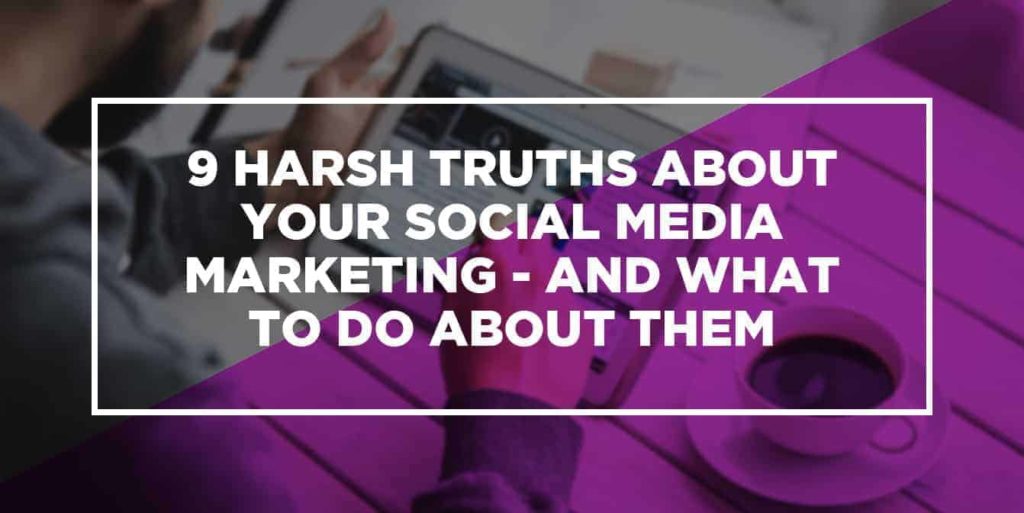Social media marketing has too often been portrayed as the silver bullet for the challenges brands regularly face.
Need to improve your customer retention? Post more on social media!
Need to expand your customer base? Post more on social media!
Want to grow your business by 5,000%? Post more on social media!
You get the picture.
And while social media is certainly something that you can’t afford to ignore, we’re sorry to tell you that it’s not going to instantly – or even eventually – solve all your business problems.
It’s a bummer, we know.
But all is not lost. When you know the truth about social media, you can figure out how to best put it to work for your brand. With that in mind, here are 9 harsh truths about your social media marketing, and what to do about them.
Some “guaranteed” social media tricks just won’t work for you, no matter how much they work for other brands.
You can find all kinds of information online about social media tricks that are “guaranteed” to get you more leads, to increase your reach, to get you noticed by top influencers, etc.
While there’s likely at least a grain of truth to most of these tricks, none of them work for every brand.
Some of them don’t even work for most brands.
And some might seem to work for every other business you talk to – just not you.
You could become discouraged by this fact. The smarter path, however, is to improve your ability to tell whether or not the social media tips you come across are likely to work for you.
You do this by getting to know your own brand better, as well as your audience. What’s your brand voice? Is it clearly defined? Is it effective? Where does your audience hang out online? Where do potential customers hang out online?
Once you’ve got a strong handle on that information, you’ll be better able to see through the social media fog and discern the tactics that truly have the potential to deliver for you.
No matter how great your content is, lots of people still won’t consume it.
Content takes time to produce – even a single tweet has to be carefully considered before you unleash it into the world.
With all the emphasis that digital marketers place on content – it’s vital for expanding your reach, for example, and it’s huge for SEO – it’s easy to think that a great piece of content should spur a great reaction from your online audience.
But this just isn’t always the case. You could spend hours putting together a web course that you know will help people achieve their most challenging fitness goals. You could curate an epic list of the best grilling and barbecuing blogs on the web that you know your followers will love. And yet, sometimes, the reaction will be much less impressive than you would have expected.
But here’s what you do: instead of focusing on the people who aren’t paying attention to that awesome piece of content, focus on the ones who are. Engage with them in an authentic way. Find out what they liked about it, and then make more content like it.
For the ones who aren’t listening to you yet, try different formats and styles of content to see if something else might resonate. You’ve also, however, got to accept that some people will never be interested in your brand, no matter what you do.
Now, if your content is consistently getting low views and low engagement, that’s a sign that you need to take seriously. It means you need to rework either your approach or your sharing strategy.
Mistakes are inevitable. But big mistakes are not.
Everyone makes mistakes – even experienced marketers. Some mistakes are passable, something to just take note of and make sure not to do again.
But then there are the big mistakes. The mistakes like a misappropriated hashtag that creates a major firestorm online. Or a misidentification of a celebrity, like Total Beauty, did during the 2016 Oscars:

Source: CIO magazine
That’s Whoopi Goldberg, not Oprah, by the way.
These are the mistakes that can really set your brand back, causing your customers to turn their backs on you.
Prevent these faux pas by entrusting your social media accounts to employees whom you trust implicitly, and who take their responsibilities seriously. You may also want to have some kind of process for approving tweets or posts that are likely to be seen by a much wider audience – say, those that go out during a major event like the Oscars.
Long-form content is what readers (and Google) want these days. It’s time-consuming and resource-heavy.
You probably know that the internet is moving toward more long-form content – long, researched, expert posts that provide lots of value to readers.
This is a huge step forward for the quality of content on the internet. Just think, for example, about what the content farms of the early 2000s were churning out. That’s what we had to read online.
Today, you can take full courses online with real professors, learn business leadership strategies from actual successful CEOs, read short stories in progress by talented published authors. How far we’ve come.
That said, creating this kind of content takes time and talent. Be prepared for that when embarking upon your next content marketing campaign.
You can’t make something go viral.
There’s not a whole lot to say about this one. No one’s definitively figured out what makes something go viral, although there are a lot of strategies you can employ to improve your chances.
There are just too many different factors that go into to virality: what’s going on in the news that day, the time of day content was shared, the general popularity of your topic at the time you shared your content, etc.
Instead of trying to make something go viral, just try to create compelling content. That’s a much more worthy – and achievable – endeavor.
Your Facebook LiveStream might only get a small number of views at first.
Like social media itself, live streaming is something that brands can’t afford to ignore these days. The internet is becoming ever-more video-centric – in fact, according to an oft-quoted Cisco report, 82% of all consumer internet traffic will be video traffic by the year 2020.
And live streaming is becoming more and more mainstream, mostly thanks to Facebook Live.
But before you jump on the live streaming boat expecting to skyrocket your engagement, it’s important to realize that you may not get all that many views the first time you broadcast – or even the 5th time. It takes some solid strategizing to get your live streaming to the point that your fans are setting calendar reminders so they don’t miss it.
For tips on how to make your live streaming successful, read “10 Ways to Amplify Your Brand Reach with Live Streaming.”
It’s really hard to be funny online.
Some brands – like Old Spice, for example – have become absolute masters at being funny online.
However, plenty of other brands fail at comedy every day. The people behind those tweets and Facebook posts might be hilarious in real life, but funny doesn’t always translate to the virtual world.
That’s why it’s safer not to try too hard to be a comedian online – unless you’ve got a full marketing team behind you that can help you craft that persona. Be clever, be quirky, be amusing – really, just be yourself (or your brand’s self). By being genuine, you’re bound to step into funny territory at some point or another.
Often, you can’t predict which of your social media campaigns will be major successes.
Analytics are crucial, and they can help you predict future successes and learn from past mistakes.
However, in the world of social media, it’s a harsh reality that it’s often hard to predict whether a campaign will be truly transformative. This is true no matter how in-depth your analytics are and how adept you are at interpreting them.
Instead of chasing the proverbial whale, then, your best bet is to simply focus on using your analytics to create effective campaigns. Set specific goals, like increasing your number of qualified leads, and build campaigns that are designed to help you meet those goals.
Just like you can’t control whether something will go viral, you can’t control whether a campaign will blow through all your previous traffic records. You can, however, control the thought, effort, and strategy you put into your campaign development.
Social media success is not instant.
Succeeding on social media, in terms of benefiting your brand, takes time – likely, more time than you expect. Even if you see a huge increase in the number of followers you have, it may still take some time for those followers to convert into customers.
The key is to be patient and be proactive. Watch your analytics, stick to your goals, and don’t be afraid to pivot as needed.
Social media can be a jungle, but if you stick it out and keep learning, you’re bound to succeed. To improve your chances, check out our post “12 Must-Have Social Media Skills for Every Digital Marketer.”




